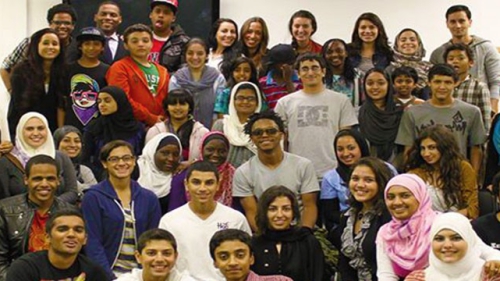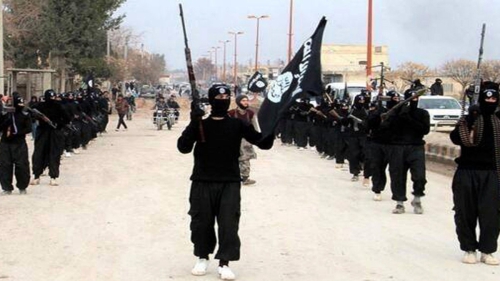Fighting Extremism With Knowledge: Learning The Lessons Of Muhammad
NPR's Tom Gjelten reports.
TOM GJELTEN, BYLINE: We know a lot about the Prophet Muhammad as a man because personal recollections of him, first passed on orally, were put down in writing about two centuries after his death. These narrations are part of what's called the Hadith, and they're important Islamic texts.
UNIDENTIFIED WOMAN: (Foreign language spoken).
GJELTEN: Sheikh Hassan Lachheb, a young Moroccan-born Islamic scholar now living in Tennessee lectures in a weekend course called Portrait of a Prophet. He reads some of these original writings about Muhammad aloud and then translates them. Each reference to the prophet is followed by the words, in Arabic, peace be upon him. No detail is too small to note.
UNIDENTIFIED WOMAN: This girl said that my uncle sent me with some fuzzy, small cucumbers. They had a garden, had some cucumbers, they send it with me to the prophet (foreign language) knowing that he likes, you know, those fuzzy cucumbers, right?
GJELTEN: Besides fuzzy cucumbers, Muhammad liked melons and he drank date juice mixed with milk and honey. The stories are from a collection of Hadith about Muhammad that were put into book form about a thousand years ago. That book is the text for this weekend course held at a mosque in suburban Maryland. The young Muslims who signed up for the lectures learn how tall he was, what kind of sandals he wore, even whether the prophet snored or not. Though the stories may seem trivial, they serve a purpose by humanizing Muhammad and thereby making it easier for Muslims to emulate him. Dalia Mogahed is one of the guest speakers featured in the course.
DALIA MOGAHED: Well, one of the things that we're taught is that we should love the prophet, not just intellectually but experientially. We should really experience an affection for this person. How do we do that without detailed information? The way he walked, the way he stood, the way his hair looked - it's about imagining who he was.
GJELTEN: The goal here, Sheikh Hassan says, is to interest Muslim American youth in their own religious tradition.
HASSAN LACHHEB: The life of the prophet, peace be upon him, provides this venue because it's very detailed. And you can connect event from the tradition of the prophet to the lives of people. And at the same time, it's not too remote from them because it also addresses their issues, emotional and intellectual, and just practical.
GJELTEN: Here's another tidbit from the lecture. The prophet had gray hair, though he sometimes died it to cover up the gray.
UNIDENTIFIED WOMAN: Dyeing was part of the culture. They would dye it with reddish things or put henna on it, right? But he had hair, I mean, it was - when he doesn't put oil on, it is visible. It's invisible.
GJELTEN: But that does not mean good Muslims should think they have to dye their hair just because the prophet did.
UNIDENTIFIED WOMAN: So the father of (unintelligible) has completely gray hair. And the prophet told him, why don't you change it to something reddish? It looks good. But he didn't oblige them to do it. It was a cultural thing more than anything else.
GJELTEN: A cultural thing. The Sheikh emphasizes this point over and over again in his lecture that some of what Prophet Muhammad said or did or advised others to do should be seen in its historical context and had little or nothing to do with Islam. It's a lesson the young Muslims attending this course appreciate and can apply in their own lives. Ferhan Guloglu, born in Turkey, is now a graduate student in Washington, D.C., and dresses like one.
FERHAN GULOGLU: I'm wearing jeans to be more comfortable. And it's not what my mom used to wear, but here he is teaching me it doesn't make me less Muslim.
GJELTEN: The Sheikh, during his lecture, sits cross-legged on a stage in front of his students alternately reading from the text and offering commentary. He came to this country from his native Morocco 15 years ago at the age of 27. Those lectures are in a mosque, they're not in the main prayer room and they are less formal than the sermons given at Friday services. The men and women are both up front, women mostly sitting on one side, the men on the other. But it's not rigid. Some women sit with their husbands, some husbands with their wives. Moaz Hayat, a college freshman from Louisiana, says the discussion is very different from what he hears when he goes to his mosque with his parents.
MOAZ HAYAT: Most of times, they're just trying to tell you just specific things you should follow, specific morals, maybe - almost a specific rule, like, many cases. But this is just - they're just telling you, you know, how the prophet, peace and blessings be upon him, you know, just acted.
GJELTEN: What he was like as a person.
HAYAT: Yeah, as a person.
GJELTEN: It's more biography than theology. Moaz says one lesson he's taken from these lectures is that he should exercise more because the prophet was well-built and very healthy. Other students say they've gotten guidance on how they should treat their wives or husbands or parents or children. But there are also more serious lessons. The Sheikh related how the prophet adopted new customs when he moved from Mecca to Medina, a more diverse settlement with a large and thriving Jewish community.
LACHHEB: He adopted a lot of ways of the Jewish people that are not legal, that are not ordinances, right?
GJELTEN: The Jews, for example, wore their hair in a distinctive style. Muhammad changed his own hairstyle to match theirs. He wanted to show respect for the Jews, the Sheikh explained, because he saw them as a cultured people with a tradition.
LACHHEB: He wanted them to feel that they are close.
MOGAHED: He wanted to lessen the barrier between them, he wanted to connect with them, he felt that there was a commonality.
GJELTEN: Dalia Mogahed, the guest speaker and herself a scholar of Muslim-American communities, says that story of Muhammad reaching out to the Jews of Medina has important lessons for how Muslims in America should relate to a diverse society.
MOGAHED: This means is that we have to understand the culture in the context that we live in. We can't set ourselves apart unnecessarily. While we should not compromise our principles, we should do all that we can to connect to people and respect their culture.
GJELTEN: Hardly an original thought, but what's important for Muslims here is that it's what the Prophet Muhammad himself taught and practiced. And it leads to the most important takeaway from this course, one that goes well beyond the anecdotes. Young Muslims who look for more purpose and meaning in their religious life can find it in the teachings of their prophet and should not be misled by extremists who don't honor his message of compassion. It's a point Sheikh Hassan says counterterrorism officials, with their emphasis on surveillance, sting operations and community policing, have so far failed to grasp.
LACHHEB: Most of it doesn't work, to be honest with you. Most of it is well-intended but not well-informed. And I don't think it's going to have any impact.
GJELTEN: Better strategy for countering violent extremism, he says, would be to support those in the Muslim community who work daily to give their youth a deeper religious grounding.
LACHHEB: If you have a religious radicalization and you're completely bypassing the tradition that's actually never been radicalized - never been - and always produced beauty, always produced involvement in the communities, always produced tolerance - and you're bypassing all of that to come with a political solution. I don't think it's going to work.
GJELTEN: Sheikh Hassan Lachheb of Knoxville, Tenn. The organization is CelebrateMercy. The course he teaches in cities around the country is called Portrait of a Prophet. One course will be held next month in Arizona. Tom Gjelten, NPR News.








